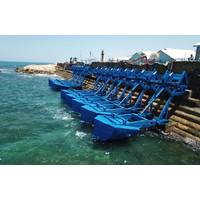Oil Slips as Rally Fades
Polls tip Britain likely to remain in EU; Saudi Arabia's crude oil exports dropped in April.
Oil prices fell on Tuesday after a strong two-day rally abated amid volatility fed in part by a vote later this week in Britain that will determine whether the country will leave the European Union.
A one-month ceasefire between the government and Nigerian militants whose attacks have curtailed the country's crude oil exports also added a bearish signal to a market that had firmed on the back of supply disruptions.
Brent crude August futures were trading at $50.05 at 1100 GMT, down 60 cents a barrel. The contract has risen by more than 6 percent since Thursday's settlement, after dropping 10 percent in six previous sessions.
U.S. crude's expiring July front-month contract was down 60 cents at $48.77 a barrel. The more actively traded August contract, the new front-month from Wednesday, was down 52 cents at $49.43. That contract settled up nearly 3 percent at $49.96 on Monday.
Two opinion polls released on Monday suggested support for Britain staying in the European Union had recovered some ground following the murder of a pro-EU lawmaker last week, although a third survey found backers for "Brexit" ahead by a whisker.
But analysts said a rally on the back of polls was tenuous.
"There is probably too much confidence about the outcome of the Brexit referendum at present - recent days have shown just how quickly public opinion can shift," Commerzbank said in a note. "Against this backdrop today's price losses make sense."
Stocks also failed to build on the previous day's momentum in early trading as investors turned cautious ahead of Thursday's referendum.
Commerzbank's Carsten Fritsch said the ceasefire in Nigeria added "additional arguments in favour of lower prices," while cautioning there was still risk of further attacks on oil facilities in the country. The deal, reported in local media, was not immediately confirmed by state oil company NNPC.
Elsewhere, Saudi Arabia's crude oil exports dropped in April despite high production levels, suggesting its battle for market share against U.S. shale drillers may be running its course. Analysts at JBC Energy said the country's stocks of oil were likely to fall further in the coming months as domestic demand stays strong and exports continue.
But Russia beat out Saudi Arabia as China's largest oil supplier in May, the third month in a row it topped the list, highlighting a still-fierce battle for market share.
Additionally, with oil prices up more than 30 percent this year, shale drillers are looking at turning the taps on again and have proven resilient beyond Saudi and OPEC expectations.
Iran has also increased crude export capacity at its main terminal on Kharg Island to allow eight tankers to load simultaneously, the oil ministry's news agency Shana reported on Monday.
By Libby George


